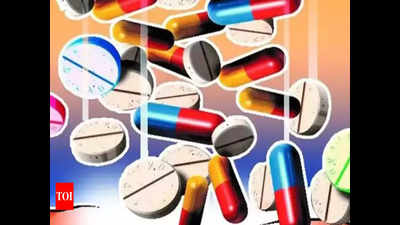- News
- City News
- ahmedabad News
- ‘Gujarat eyeing 45% share of pharma pie’
Trending
This story is from June 11, 2019
‘Gujarat eyeing 45% share of pharma pie’
Inaugurating the three-day International Pharma & Healthcare Exhibition (iPHEX-2019), jointly organized by Government of India’s department of commerce and Pharmaceuticals Export Promotion Council (Pharmexcil) in Gandhinagar, chief minister Vijay Rupani on Monday said that the state government is taking steps so that Gujarat’s share in pharmaceutical production in the country goes up from the present 30% to 45%.

Representative image
GANDHINAGAR: Inaugurating the three-day International Pharma & Healthcare Exhibition (iPHEX-2019), jointly organized by Government of India’s department of commerce and Pharmaceuticals Export Promotion Council (Pharmexcil) in Gandhinagar, chief minister Vijay Rupani on Monday said that the state government is taking steps so that Gujarat’s share in pharmaceutical production in the country goes up from the present 30% to 45%.
“The state government is committed to set up a medical devices park in Gujarat in collaboration with the central government,” he said. The CM appealed to drugs and pharmaceutical companies to provide medicines and healthcare facilities, particularly for serious diseases, at affordable prices by the next two decades. “The industry should treat it as a godsend opportunity to serve the people, and not just as a commercial venture,” he said.
Rupani said that MoUs for investments worth Rs 10,000 crore were inked during the Vibrant Gujarat summits, creating new job opportunities. He had a word of praise for institutes like NIPER and PERD in providing the manpower for the industry.
He went round the stalls set up by nearly 370 exhibitors and 700 firms from 120 countries attending the exhibition. Gujarat government’s health and family welfare additional chief secretary P K Parmar said that India’s first pharmaceutical company was set up in 1907. “Currently, there are 3,500 pharmaceutical companies in Gujarat, providing jobs to one lakh people and contributing one-third of the national production. Over 600 of these companies are approved by the WHO,” he said.
“The state government is committed to set up a medical devices park in Gujarat in collaboration with the central government,” he said. The CM appealed to drugs and pharmaceutical companies to provide medicines and healthcare facilities, particularly for serious diseases, at affordable prices by the next two decades. “The industry should treat it as a godsend opportunity to serve the people, and not just as a commercial venture,” he said.
Rupani said that MoUs for investments worth Rs 10,000 crore were inked during the Vibrant Gujarat summits, creating new job opportunities. He had a word of praise for institutes like NIPER and PERD in providing the manpower for the industry.
He went round the stalls set up by nearly 370 exhibitors and 700 firms from 120 countries attending the exhibition. Gujarat government’s health and family welfare additional chief secretary P K Parmar said that India’s first pharmaceutical company was set up in 1907. “Currently, there are 3,500 pharmaceutical companies in Gujarat, providing jobs to one lakh people and contributing one-third of the national production. Over 600 of these companies are approved by the WHO,” he said.
End of Article
FOLLOW US ON SOCIAL MEDIA










